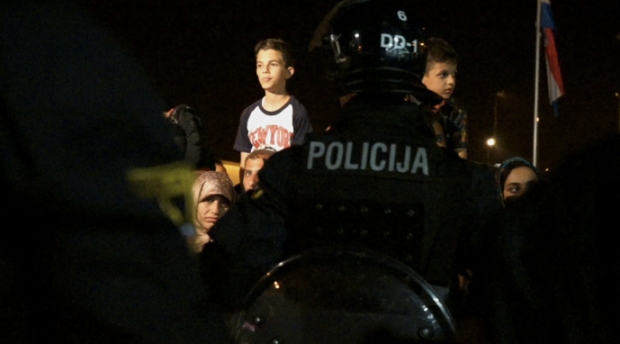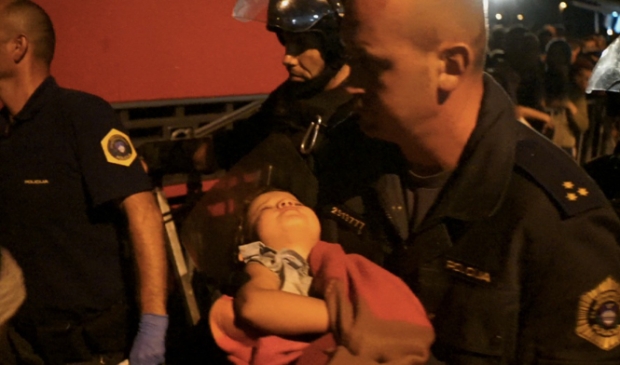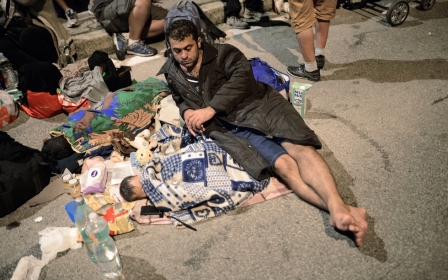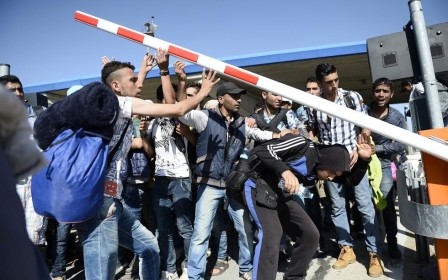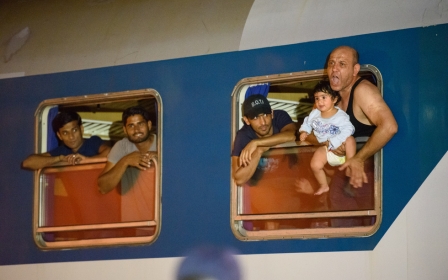Desperation and fear grip refugees travelling through Croatia
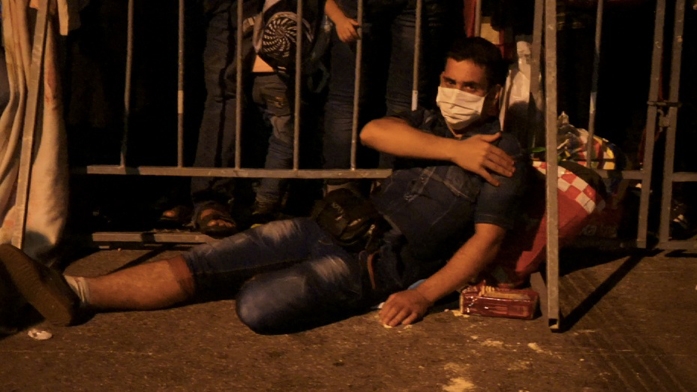
CROATIA/SLOVENIA border - At just past 7pm, Said and his family crossed the highway at the exit that separates Croatia from Slovenia.
His wife, a baby and another child of about three years were all waving the EU flag.
Said would like to enter the Schengen area – the name for the area of 26 European countries that have abolished passport and border control at their common borders – after being rejected at the Hungarian border a few days earlier. After arriving in the Croatian capital, Zagreb, he and his family walked for 13km.
"Where are we? We're lost,” Said told MEE in a broken voice. "My wife is tired - she walked for hours - and the baby did not eat this morning."
So began a long night of trekking along the border with Slovenia.
With the Hungarian border closed, thousands of stranded refugees, like Said and his family, have sought alternative ways to get to the European Union.
On Friday, Croatia closed almost all of its eight border crossings with Serbia to its east to prevent the passage of refugees, while Slovenia stopped rail traffic from Croatia, a decision made after 150 asylum seekers were detained as they travelled the short distance to the Slovenian border town of Dobova.
Hundreds have ventured back into the valleys of Serbia and Hungary to hide from police checkpoints.
The Slovenian government tried to stem the flow into its country by having dozens of policemen in riot gear shield the highways linking it to Croatia, preventing several families coming to cross the barriers, but as numbers swelled, the police decided to let families with small children and those who needed medical assistance through.
"After what we have seen in recent weeks and in recent months, [we] widely expected that the exodus would come to us," said Stephan, a local who – by himself – is helping to answer the refugees’ needs. Stephan lives in Croatia and speaks Arabic and is the only one among this group to mediate between the people and police.
The men in the group pull Stephan closer to the police barrier since almost no one - barring Stephan - speaks English.
Regardless of where they came from – Syria, Iraq or elsewhere - mothers and fathers began to raise their children in the air as a plea for help. Growing frustrated at the lack of answers and after hours of waiting, they give their children to the police, shouting "Take them! Take them at least."
Stephan tried to listen to each concern - whether it involved families with small children or those who required medical attention. The police could let in only a few dozen people, while hundreds more had to wait all night without a blanket, a tent, or water.
Mothers nursed their children along the highway amid the rain, fathers sought shelter for their children by putting them to sleep under the wheels of a truck to protect them from the wind, and grandparents – feeling desperate - shook their palms against their foreheads, invoking Allah.
According to official estimates, more than 20,700 refugees have passed through Croatia and veered northward.
Out of that figure, only 2,000 have managed to arrive in Slovenia, where they are then directed to several registration centres.
One hundred and nineteen refugees have arrived at the centre in Brezice; the registration centre in Celje has welcomed 200 refugees; in Gornja Radgona, not far from the Hungarian border, more than 200 refugees await.
Transport is a key problem as the railway connection between Croatia and Slovenia remains closed.
"There are no buses for all,” said Stephan. “I am shocked that a civilized country such as the country where I live is not able to give an answer to this emergency. ... We have the responsibility of being a Schengen country. We cannot forget it," he told MEE.
Many of the refugees who pass through these centres - and there are not enough to accommodate all the refugees in Slovenia - do not actually get registered or have their names written on any roll sheet; most likely they will be accompanied to Slovenia's border with Austria or Italy.
The police declined to comment on whether their directives hail from the Interior Ministry.
Mohamed Talaman, an electrical engineer from Baghdad, needed his wife Fatima to look after their two children because he had a broken hand, crushed when the boat in which they were crossing the sea from Turkey to Greece ran into a rock. With no medical care, he is hoping time will heal his fracture.
He told MEE: "Look at what I'm running away [from]."
He found two videos in his phone, one showing the Islamic State group severing heads in public. The other displayed IS members torturing Iraqi soliders.
"I was well-off on my land, I spent $10,000 to bring my whole family here and it looks like I have to justify the reasons that led to my choice. I take care of these videos because some Europeans think that we are begging for aid,” he said.
“We do not want handouts. We want you to understand that in Baghdad I had a good job and a nice house, and now I'm forcing my children to sleep on the cement because I do not want that one day somebody cuts their heads off in a square,” he said.
The trail of refugees is made of people from different cultures and religions, but all united by the need to escape homelands mired by conflict and to seek a better future.
At 11:00am, no international humanitarian organisation had arrived on the border. Instead, dozens of locals - Slovenians and Croatians like Stephan - spent the night seeking to comfort and help the refugees.
Mary, a 16-year-old local volunteer, told MEE: "I spent the whole night preparing boxes with my peers, knocking door to door to all women I know if they had something to give to those in need,” she told MEE.
“This is the Europe we want and represent. Not a Europe which takes seven hours for an ambulance to come and take a three-year-old child with a fever arbitrarily locked in at a border," she said.
New MEE newsletter: Jerusalem Dispatch
Sign up to get the latest insights and analysis on Israel-Palestine, alongside Turkey Unpacked and other MEE newsletters
Middle East Eye delivers independent and unrivalled coverage and analysis of the Middle East, North Africa and beyond. To learn more about republishing this content and the associated fees, please fill out this form. More about MEE can be found here.


